Life can feel unsatisfying when we’re unable to concentrate on the moment. When our thoughts are consistently elsewhere worrying about the future or reflecting too much on the past, we pull the joy out of the present moment and forget to take life light-heartedly. It also causes us to fail to see the beauty of now, leaving us in a constant state of distraction.
[the_ad_placement id=”in-text-1-type-r”]Stress can reduce our life-expectancy and lead to bad health, which is why learning natural remedies for anxiety is essential when we’re feeling off-put or worried about something that will either happen in the future or has happened to us in the past. This guide will help us take a look at anxiety, its symptoms and causes, and 21 ways we can deal with anxiety without the help of doctors or prescriptions.
Anxiety is an undesirable emotional state of mind reflecting inner turmoil that induces nervous behavior. In other words, it’s the sensation of dreading an anticipated happening, or reflecting on a memory and allowing it to disrupt the current moment with worry. Once the mind begins to flood with worrisome thoughts, the body begins to reflect said worry with several differing and unpleasant side-effects such as increased heart rate or tension.
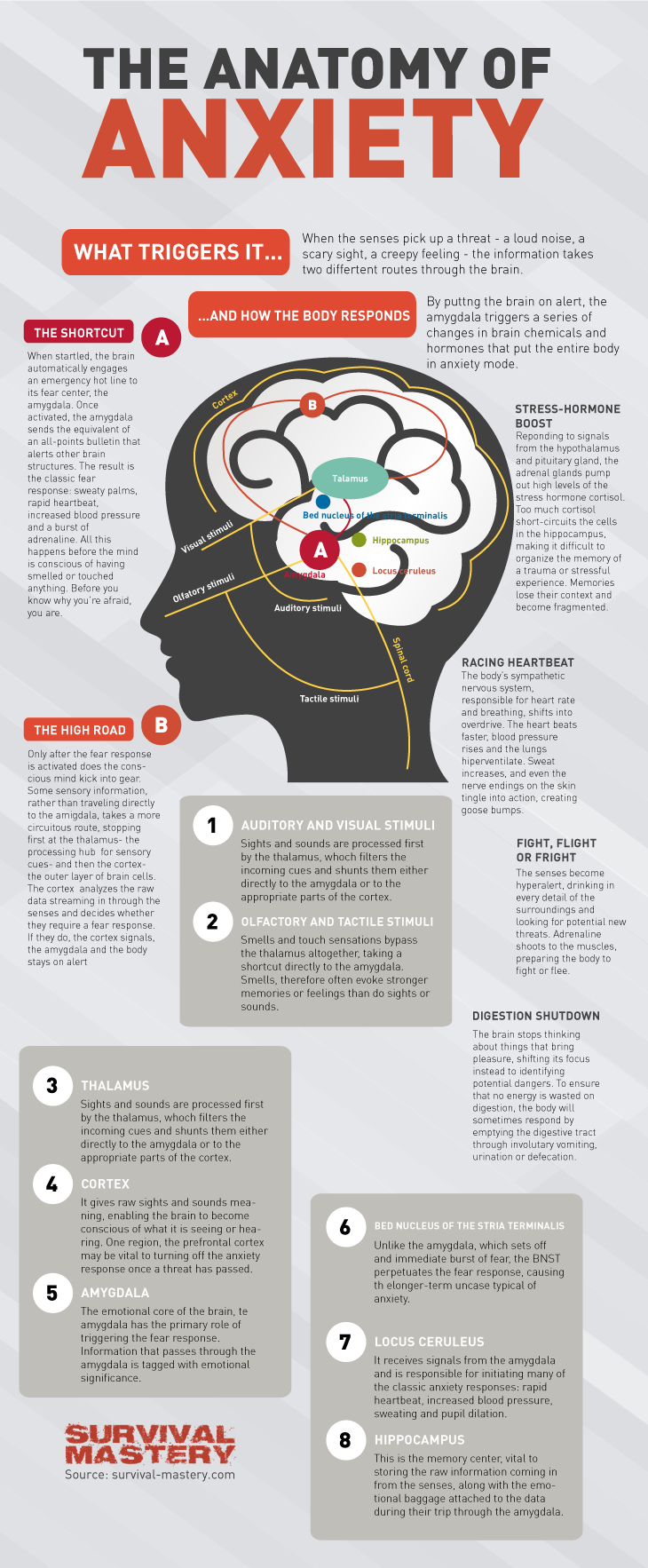
We often feel anxiety before presentations, exams, or a life-changing event such as having a baby or starting a new career. Anxiety differs from fear in that fear is a reaction – it often is accompanied with a “fight or flight” situation and can be fleeting. Anxiety on the other hand is consistent and much harder to control as we foresee the coming event that is causing the anxiety, or we’ve experienced the situation that gives us anxiety.
Forms & symptoms of anxiety
We’ve heard the saying that life is like a roller-coaster, with lots of ups and downs. The vast majority of us experience “normal” amounts of anxiety when we know we’re about to partake in an event that is out of our comfort-zone, or when we’re in unwanted life situations (the “downs” of the life roller coaster).
Knowing whether we’re experiencing these normal “downs” in life versus a more serious condition is essential in how we attack the anxiety we’re feeling. It’s a good idea to keep a small journal with us to note any changes in emotions and physical behavior; when anxiety suddenly hits us, and what triggers the anxiety.
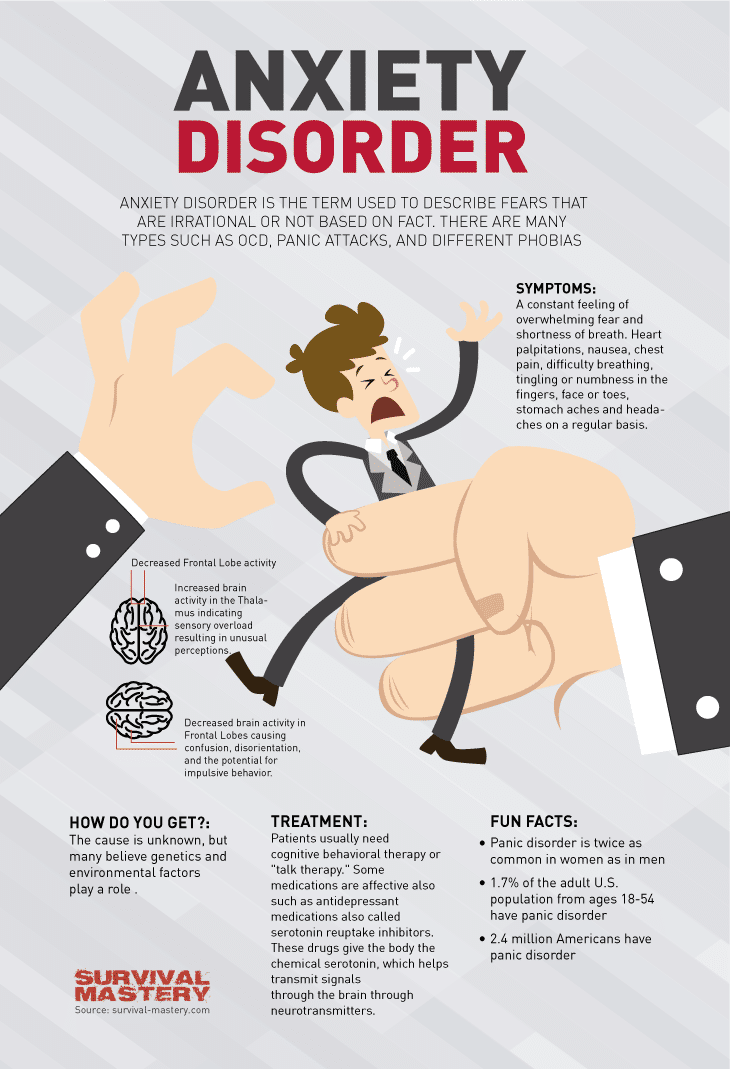
This will help us establish the reasons behind our anxiety and the events that cause us to begin to worry, so we can pinpoint where the anxiety comes from and how we can effectively rid of it. Listed below are differing types of anxiety and their symptoms.
Generalized anxiety disorder
This disorder is experienced when unrealistic worry harbors the bulk of our thoughts, the majority of the time, without a specific reason. This is particularly so when there is little to nothing in our life provoking anxiety. It’s a consistent state of nervousness, and disrupts a grand portion of our lives, reducing our ability to concentrate. Symptoms often include:
- Insomnia; frustration; edginess; feeling out of control
- Fatigue; exhaustion; short energy levels
- Tense muscles, especially in the shoulders, neck, and back
- Problems focusing on a task or concentrating
- Fixating over negative thoughts
Various forms of anxiety
Panic disorder – panic attacks are often induced by a surge of worrisome and irrepressible thoughts, leading to the sensation of uncontrollable panic and fear. Symptoms include:
- Rapid heart rate; palpitations; irregular/fast heart rhythm;
- Hot and/or cold flashes; excessive sweating
- Problems breathing; light-headedness; dizziness
- Chest or stomach pain
- Numbness; weakness in body
Social anxiety disorder – this type of anxiety (AKA social phobia) occurs within normal, everyday social situations and surrounds the notion of being extremely self-conscious. Symptoms include:
- Obsessive thoughts over being judged/watched by others
- Paralyzing fear of public speaking (beyond “normal” anxiety levels)
- Experiencing panic when around unfamiliar people
- Anxiousness when thinking about social situations, even when not currently in one
Specific phobias – Phobias are powerful feelings of anxiety towards a specific subject, object, situation, etc. Symptoms include:
- Instantaneous terror when confronted with a specific subject/object/etc.
- Knowing of the illogical fear but unable to control a negative overreaction to its presence
- Avoiding situations consistently involving that which causes fear
- Restricting oneself in routine to avoid the feared subject
Post-traumatic stress disorder (PTSD) – PTSD is a form of anxiety brought on from experiencing a traumatic event. Symptoms include:
- Reliving the event in our mind which has caused us trauma
- Reacting to “triggers” that induce the flashback of trauma (such as noises, smells, etc.)
- Recurring anxiety over the trauma happening again; consistent fear of it happening again
- Emotional disturbances in thinking and planning for the future
Separation Anxiety Disorder (SAD) – While this type of anxiety is most common in children, it can carry on into adulthood if left untreated. SAD is when we experience anxiety over being separated from either our home or people we’ve created strong emotional attachments to. Symptoms are:
- Extreme anxiety when separated from home or loved ones
- Refusal to leave home or leave the side of those we’ve formed attachments to
- Recurrent nightmares of separation from home/emotional connections
- Headaches, stomachaches, or nausea when separated from main attachment
- Constant worry of losing major attachment
Substance-induced anxiety disorder – This type of anxiety is only found in those either taking drugs, prescription medications, or have ingested/inhaled toxic substances.
Anxiety via medical conditions – Like substance-induced anxiety disorder, anxiety experienced through medical conditions derives from abnormal physical/psychological ailments fixed within our biology.
We can experience many of the differing symptoms listed above, depending on what medical condition we have. Researching our medical condition is relevant to finding out if it also causes anxiety.
Recognizing anxiety
It’s one of the most commonly untreated conditions that a vast majority of the world’s population experience. Our lives feel stressed because we fail to acknowledge the amount of worry that’s consumed us, and learning how to get rid of anxiety can be as easy as taking five minutes out of the day to clear our minds. However, we must not fall into a course of denial, hard-headed and believing our problems can only be solved if thinking about solutions constantly.
[the_ad_placement id=”in-text-2-type-r”]Anxiety hangs about our heads when our minds are always racing; when we are unable to focus on the moment surrounding us. Knowing we’ve difficulty seeing the moment and living within it is the first step towards solving our unhappiness – even if we’re unaware we’re unhappy.
Steps to control anxiety
Before diving into the many remedies of anxiety, it’s a good idea to first become aware of how the anxiety is affecting us and the steps we’ll need to take in order to reduce it for good. They’re relatively simple, and following them can greatly improve our mood over time. However, these steps won’t work if the anxiety experienced is induced by medications, drugs, or medical conditions. Such causes must be looked at on a biological scale rather than psychological.
- Study our anxiety – First, let’s get to know our thoughts. What is it we’re always thinking about? Why do we think about it? Is there anything we can do to eliminate these thoughts in the moment, and if not, why do we choose to focus on them when we’re unable to do anything about them at this time?
- Take action – Decide on a remedy or remedies. We should ensure they comfort us and help our minds and bodies relax, losing ourselves in the moment and becoming unafraid to push all thoughts aside as our muscles and heart rate ease.
- Follow a schedule – Once we’ve decided what remedies to try, we must remain consistent in treating ourselves with the remedies. Plan a time either every day or every other day to proceed with the remedy. This is when we can tweak which remedies we’ve chosen as well, deciding if one is better than another or if we prefer something different. The more consistent we are in practicing our remedies, the more success we’ll have in eliminating our anxiety.
- Involve family or friends – Socialize with loved ones. If we tell our family or friends the new activities or foods/drinks we’re now taking to ease the stress from our lives, the more prone we’ll be to continue to embark such remedies. This will also provide us with an outlet. If the anxiety we’re experiencing is being pent up within, talking to others greatly helps us so that we can relate to others on our path towards healing. This way, we know we’re not alone.
- Break the cycle – Of unwanted thoughts! After trying a remedy (or more) for up to two weeks, take a close look at the stress and anxiety now experienced. Has it lessened? Do we feel a little more light-hearted? Or are we the same? We may need to switch to a different remedy or we can discover the remedies we’ve chosen are working great for us. In any case, we must evaluate whether or not our anxiety is lessening and if we can focus better in the moment.
- Let worries go – Once the right remedies are found and practiced, it’s time to let go of all the unwanted thoughts and anxiety that once tormented our bodies and minds! Acknowledging a new standing position on events/situations/subjects/etc. is key to relinquishing our past fears of the future.
21 Remedies for anxiety
From teas and reading to nutrition and yoga, there is a right and wrong anxiety reducer for us all. Browse through these different remedies that have proven to reduce anxiety and fit them into your schedule and lifestyle.
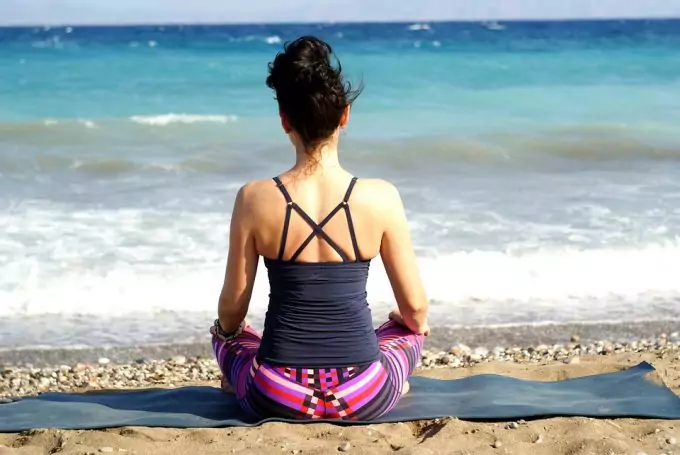
As we become more aware of our bodies’ reactions and thought processes, we’ll be able to determine which of these is right for us.
- Chamomile – Also known as Matricaria Recutita, this herb is used in teas and has traditionally been used to help induce a gentle sleep. It can be found in many night-time teas, containing a chemical compound that binds to the same brain receptors as valium. Drink chamomile tea if your anxiety keeps you up at night.
- Green tea – Native to the lands of China and surrounding areas, green tea is known for many health benefits – including curbing rising heart rate and lowering high blood pressure. If our anxiety is more physical in nature, green tea should help our bodies relax.
- Hops – Known as an ingredient in beer, hops (humulus lupulus) contains a sedative compound that actually works best without the aid of alcohol. As an anxiety remedy, it can be found as an extract and used with valerian to relax the body and help aid in sleep. Some specialty stores also sell hops within pillows since its aroma helps support sleep.
- Valerian – Often found in teas with chamomile, hops, or lemon balm, valerian root is also a relaxant and sleep aid for those of us suffering from anxiety-induced insomnia. It can be bought or made into a tincture/oil and taken orally.
- Lemon balm – Taken as a capsule, tincture, or made into a tea, lemon balm has been used since the Middle Ages to reduce anxiety and improve sleep. However, too much can increase the effects of anxiety, so if considering this remedy, start with a low dose and experiment.
- Passion flower – This plant has already been approved by the German government as a valid natural sedative for nervous restlessness. It’s best taken as tea and can be drank throughout the entirety of the day as opposed to other teas meant to improve sleep.
- Aromatherapy – Certain scents can often incline the amount of dopamine present in our brains, leaving us feeling more at peace and calm about our world – though not at the levels pharmaceutical drugs do. However, for many of us, just a little is enough to boost our mood and put us in a less worrisome state of being. Lavender, Rose, Orange, Lemon, Sandalwood, and Clary Sage are the most common aromas that help relieve anxiety. Find out which one puts you in your ideal state of being.
- Breakfast – Too often our schedules have us flying out the door in the morning, especially if we have children. Taking a few extra minutes to sit down and enjoy a decent meal packed with nutrients, even if just fruit & yogurt or a granola bar, will help improve our overall mood as we begin our day. Anxiety can be felt from lack of food, causing our bodies to increase blood pressure or become shaky from lack of nutrients. This then causes us to worry about ourselves as we feel the sensations of fasting.
- Heat therapy – Finding a good sauna or hot tub may be the simple solution our bodies need to shake off that extra anxiety. Heat naturally loosens the muscles and can help lower our heart rate, improving circulation as well as our ability to breathe more effectively. Taking 10 to 20 minutes three to four times a week in a sauna or hot tub can vastly improve our mood and health.
- Mindfulness meditation – Our thoughts are constantly streaming with things we must do, things we’ve done, or negative thoughts as we reflect on mistakes we’ve made or think we’ll make. This is when we should consider stopping and “smelling the roses”. Find a location that’s beautiful such as a park or even just our back yard, and become mindful of all that is in your surroundings. Cast out thoughts that aren’t in the here and now, and pay full attention to nature. As random thoughts enter our minds, note them, rationalize a solution to them, then cast them aside.
- Guided meditation – If mindful meditation isn’t doing it for us, it can be easier to follow a guided meditation. This works great in reducing anxiety because our minds are concentrating on the words and commands of the often soothing voice that pulls us into a deep state of mind. Following one before bedtime is also a great way to fall into a peaceful rest.
- Breathing exercises – We can sometimes forget that every single cell in our body needs oxygen. Practicing breathing exercises can help our lungs do their job more effectively. A common and effective breathing exercise is known as 4-7-8 yoga breathing. Basically, we inhale four counts, exhale four counts, inhale seven, exhale seven, inhale eight, exhale eight. Practice this four times in a row, and our bodies will naturally feel more relaxed as our minds focus on one simple thing: breathing.
- Quit smoking – We all know the horrid side-effects smoking has on our bodies. This natural remedy simple pushes us in a healthier direction, freeing our body of toxins that interfere with our brains and organs, causing us to feel better overall.
- Quit coffee – Most of us drink coffee, whether we work in an office or do manual labor, and caffeine increases our sitting heart rate and blood pressure over time making us feel restless. To ease the restlessness, try switching to decaf or throwing coffee out of our diets all together.
- Prioritize sleep – “I’ll sleep when I’m dead,” is a common phrase older generations like to push when justifying not getting enough sleep. Truth is, our bodies are designed for sleep. We aren’t robots, and our brains are still active when we sleep as opposed to when we’re dead. Sleep is needed not just for resting our muscles, but to alleviate the stresses of the mind. It’s when our immune system can focus on healing. Assuring we get the right amount of sleep is essential to a happy, healthy, anxiety-free lifestyle. Once lack of sleep sets in, our ability to focus depletes through the day.
- Exercise – Exercise naturally releases dopamine in our brain, the pleasure hormone, causing us to feel good about ourselves, our bodies, and our ability to complete the hard task of exercise. It boosts our mood, our mind, and improves health. The mind and body are connected; neither can function without the other. Taking care of one will ultimately affect the other, and exercising the body will help the mind feel better. Take 150 minutes a week to focus on your body, casting aside all those anxiety-inducing thoughts. Have the right gear ready, see our article on how to choose the best hiking shoes to make the activity enjoyable and safe.
- End catastrophic – Simply stop thinking about the worst outcome of any given situation. Anxiety often derives from these types of thoughts, and if we can successfully become more optimistic in general, we can begin to relieve our minds of the stresses that un-needed worries bring to us. Instead, think of the best possible outcomes – or, just focus on the here and now. We never know what the future truly holds.
- Avoid sedatives – Pharmaceutical sedatives, that is. These often come with side-effects and some can even lead to increased anxiety. Avoid them at all costs. Though many may help us sleep, it doesn’t mean the quality of our sleep is improved.
- Yoga – Combining breathing techniques with improved muscle movement is a wonderful anxiety reducer. Not only are we improving the health of our bodies, making them leaner and stronger, we’re also improving our lungs and blood flow.
- Nutrition intake – Cut back on sugary breakfasts and coffee. Switch snacks from chips to fruits. Taking a solid look at our diets is essential if we’re ready to alleviate anxiety within our lives. Often, high fats and sugars leads to health problems, and health problems induce anxiety. Check out our article on the benefits of honey to help you in your nutritious needs.
- Read – Tired of the real world? Grab a fantasy novel, or mystery, or whatever genre that suits your personality. Those of us that read often find a mood-boost from the worlds we travel to in our heads created by authors. It’s a chance to escape our problems for a few minutes or hours at a time, and slip into a realm of other characters we can fantasize about; wonder about.
Each home remedy for anxiety is unique. There is bound to be one, two, perhaps even three that are right for our lifestyle and needs.
[the_ad_placement id=”in-text-3-type-r”]Anxiety is a bummer, and often times we just need an essential daily mood boost to get us through to accomplish the tasks we’ve set out for ourselves.
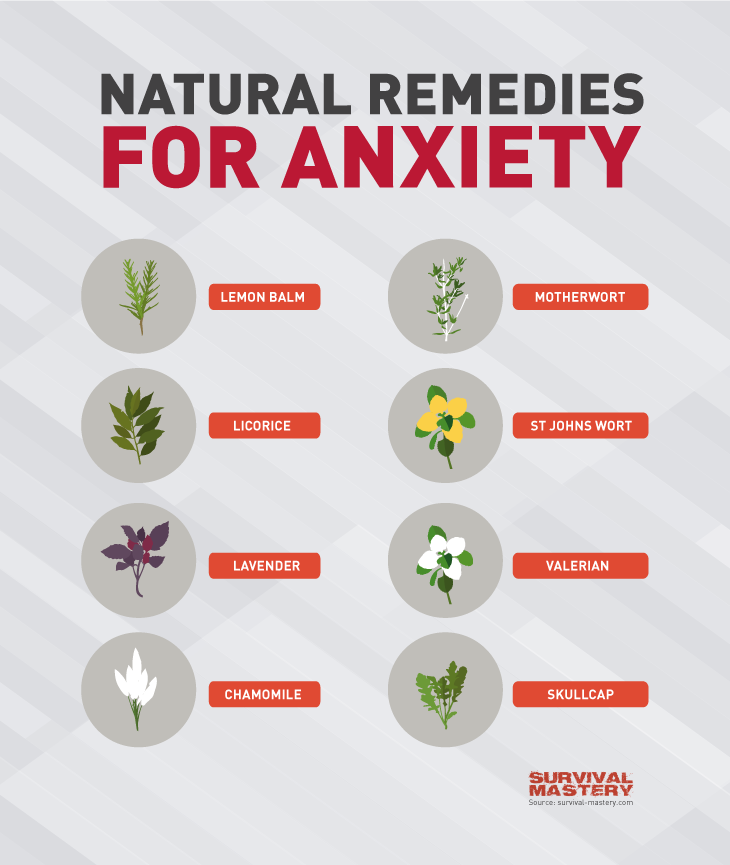
Remember that all of these remedies take time, including drinking tea, for us to set aside for ourselves. Ensuring we keep ourselves happy must be a top priority if we are to keep others that we love in our lives content. How can we make our children, parents, or loved one happy if we are suffering from the torments of anxiety?
Every day, whether its ten minutes or 60 minutes, we must take time for ourselves and create a happy and healthy mental state of being. Grab those extra few minutes of sleep if needed. Stay at the gym for another half hour if you’re feeling up to it. Stay happy, healthy, and know how to deal with the stresses life throws at you.
Nature has a way of healing the mind and spirit. See our article on the best camping tips from the experts to guide you.


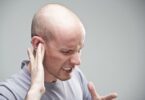
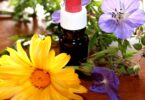


I myself went through a dark phase in my life and drinking chamomile and meditating before going to bed helped a lot in keeping myself calm. That few minutes of me time made sleep come easier. Anxiety takes its toll after a long time of suffering, you are never happy, never content. Your nails show the worst of it. Please, please if you do know someone suffering from anxiety, take the time to understand them, to talk to them.
Thank you for sharing with us, Melissa
Thanks for this article! Due to massive loads of work and it’s partner, stress, I tend to worry more, feel uneasy and tired every time. I never thought I have an anxiety disorder until a friend directly told me.
What I have learned is that life will always be riddled with confusion. But the way you view life makes a lot of difference. What helped me is a good routine of exercises, a healthy and balanced diet, sugar (mostly ice cream and chocolates), liters of water, and enough sleep.
When I feel like the symptoms are coming out, I relax and take a nap or sleep. I know reducing your coffee intake will help you to reduce your nervousness, but I can’t simply let it go. And lastly, a lot of self-control tricks about how not to think of anxiety. Praying makes a lot of difference too. :)
Relaxing when stress is apparent is a good way to prevent anxiety. Napping or reading a book is always good as well.
As someone who is struggling with anxiety for a long time, thank you. Your article will certainly help people adopt a more natural and healthy way of treating anxiety than simply popping pills.
I find breathing and exercise to work wonders. Also, if you do not feel like being social due to anxiety do not force yourself to spend time with people you do not have to. Bit of independence can go a long way, and ifyou are confident in how you want to spend time you will soon start feeling more relaxed when among people too.